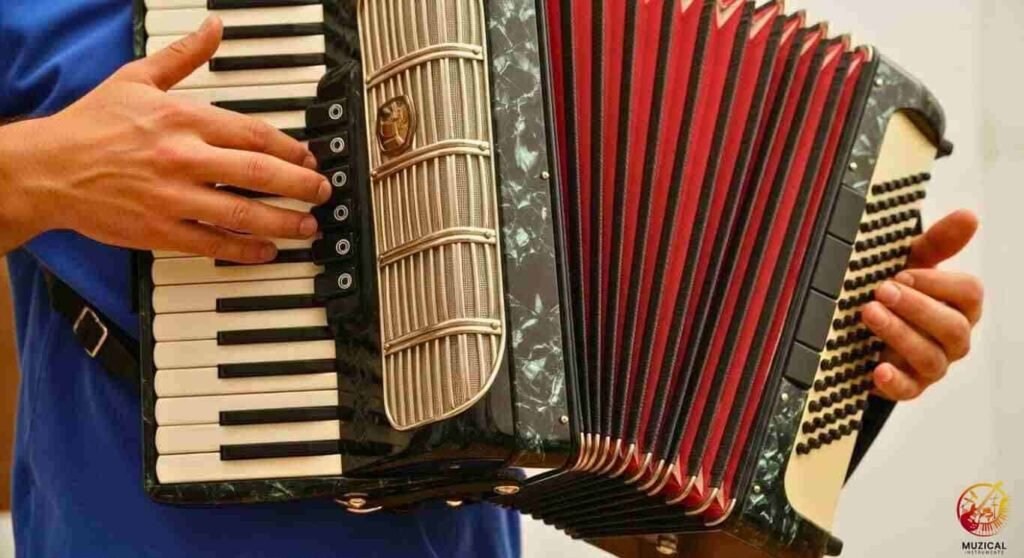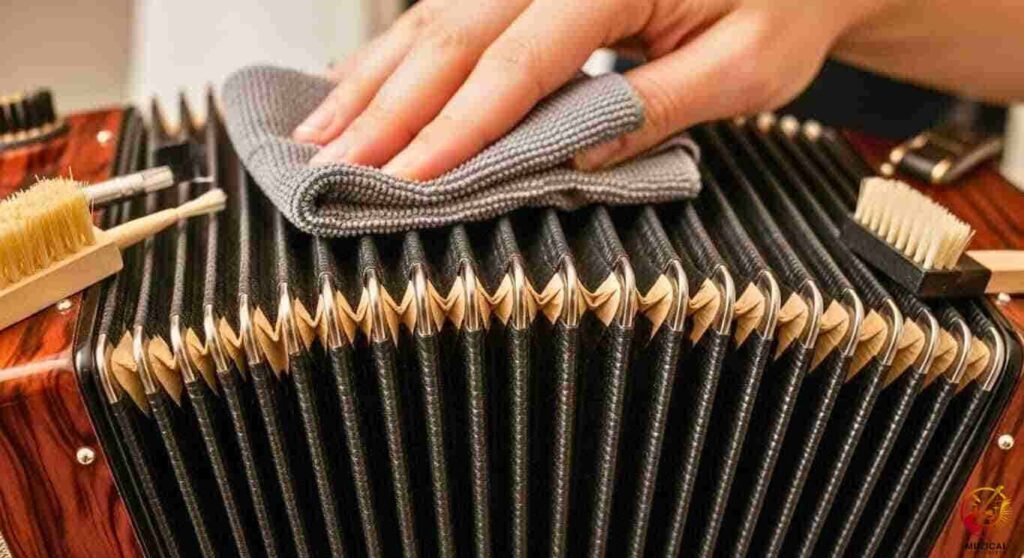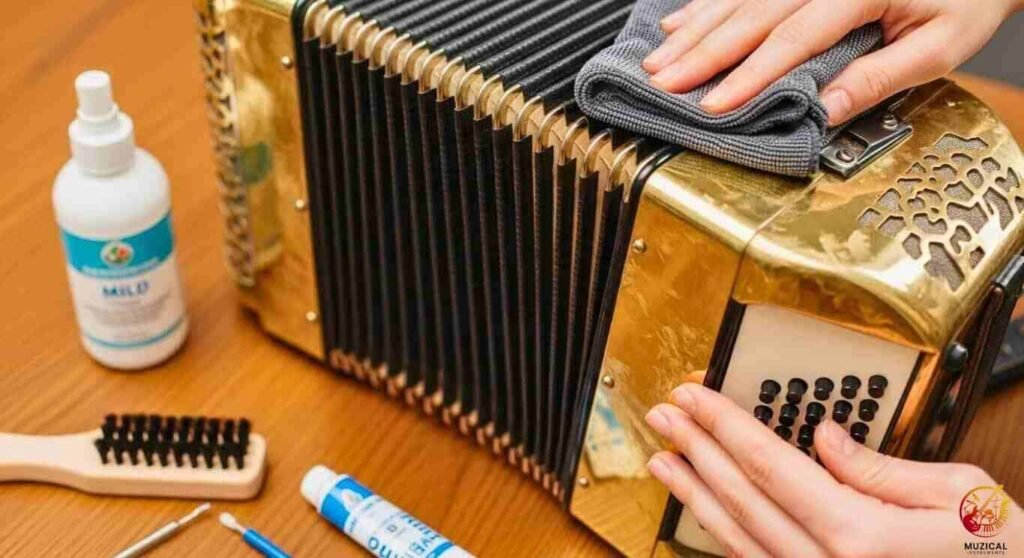Accordion Bellows Maintenance: A Complete Guide
Accordion bellows maintenance is the single most important step for keeping your instrument healthy. The bellows act as the lungs of your accordion, pushing air to create sound. Without proper care, they can dry out, crack, or leak.
This guide will teach you everything about accordion bellows care. You will learn why the common idea of “oiling” bellows is a myth, how to properly inspect and clean them, and what simple habits will prevent expensive repairs down the line.
What Exactly Are Accordion Bellows?

The bellows are the folded, flexible part in the middle of your accordion that connects the treble (keyboard) side to the bass (button) side. When you push and pull the bellows, you move air across the internal reeds, which vibrate to create sound. Think of them as the engine that powers your music. Without healthy bellows, your accordion can’t “breathe” properly.
Bellows are made from several layers of different materials that work together:
- Cardboard: The main structure of each fold, or pleat, is made from a special, durable cardboard. This gives the bellows their shape and strength.
- Cloth and Leather: The inside and outside corners of the folds are reinforced with thin leather (often goat or sheepskin) and cloth. This allows them to bend thousands of times without breaking.
- Bellows Tape: A decorative and protective cloth tape runs along the outside of every fold, protecting the edges from scuffs.
- Metal Corners: Shiny metal caps protect the four corners of the bellows from bumps and wear.
Because bellows are made of these organic materials, they are sensitive to humidity, temperature, and physical stress. That’s why proper care is not just a suggestion, it’s essential.
Why Bellows Care is So Important

Taking care of your bellows isn’t just about looks. It directly affects the sound, playability, and overall lifespan of your instrument.
Keeping the Sound Pure
The most important job of the bellows is to be airtight. No air should leak from the sides, corners, or seams. If you have a bellows leak, you must work harder to get enough air to the reeds. This can make your music sound weak and wheezy. Good compression (the ability to hold air) is the sign of a healthy bellows.
Extending Your Accordion’s Life
Bellows are delicate. Without proper care, the materials can become old and brittle. Moisture can soften the cardboard, and the leather corners can crack. If mold or mildew grows due to dampness, it can ruin the bellows completely. Good care prevents these problems and saves you from expensive repairs.
Preventing Common Problems
Regular maintenance helps you spot small problems before they become big ones. You might notice:
- Peeling bellows tape.
- A small scuff on a leather corner.
- A feeling of stiffness in the folds.
Catching these issues early means you can get them fixed easily. Ignoring them can lead to major air leaks and damage. The bellows gaskets, which are the seals where the bellows connect to the accordion’s body, can also wear out and need checking.
The Great Oiling Debate: Should You Oil Your Bellows?
Here we get to the main question: how often should you oil accordion bellows? The answer for almost every accordion made in the last 70 years is simple: you don’t.
This is the biggest myth in accordion care. Oiling modern bellows, which are made with treated papers, cloths, and leatherettes, can cause serious damage. The oil will soak into the materials, attract dust, and can even dissolve the glues holding everything together. This makes the bellows gummy, heavy, and can lead to them falling apart.
The idea of oiling comes from very old, antique accordions that sometimes used untreated leather for the corner folds. Back then, a special oil was sometimes used by professional technicians to keep the leather from cracking. This does not apply to modern instruments and was never a job for the player to do.
Instead of oiling, you should focus on keeping the materials clean and dry.
Bellows Oiling: Myth vs. Reality
| Myth | Reality |
|---|---|
| Oiling bellows makes them more flexible. | Oiling modern bellows makes them gummy and can ruin the glue. Flexibility comes from clean, undamaged folds. |
| You should oil your bellows once a year. | You should never oil modern bellows. Regular dusting and gentle cleaning is all that is needed. |
| Any leather conditioner will work. | Most conditioners contain chemicals that will harm the cloth, paper, and glues in the bellows. |
| Oiling helps seal leaks. | Oil cannot seal leaks. Leaks are caused by holes or bad seals that need to be patched or repaired by a professional. |
A Step by Step Guide to Accordion Bellows Maintenance

You don’t need to be a professional to keep your bellows in great shape. Follow these simple steps for a routine maintenance check.
Step 1: The Visual Inspection
Lay your accordion across your lap in a well lit room. Open the bellows slightly and slowly rotate the instrument, looking closely at every part.
- Check the Folds (Pleats): Look for any signs of wear, discoloration, or fuzzy-looking mold.
- Check the Corners: Examine the leather on the corners of the folds. Is it cracked or peeling?
- Check the Bellows Tape: Make sure the decorative tape is secure and not lifting away from the cardboard.
- Check the Metal Corners: Are they dented or loose? A hard knock can sometimes create a leak.
Step 2: Gentle Cleaning
Never use household sprays, polishes, or harsh chemicals. All you need is a soft cloth.
- For Dust: A dry microfiber cloth is perfect for wiping away dust from the surface and in between the folds.
- For Smudges: If you have a sticky spot, barely dampen a small part of your cloth with water. Gently rub the spot and immediately dry it with a dry part of the cloth. Never let water soak into the bellows.
Step 3: How to Perform a Leak Test (The Bellows Compression Test)
This is the best way to find out if your accordion is losing air.
- Close the Bellows: Without pressing any keys, buttons, or the air valve, push the bellows completely shut.
- Release the Air: Press and hold the air release button (the small button on the bass side that lets you move the bellows silently). Squeeze out any remaining air.
- Seal the System: Let go of the air release button. Now the bellows should be airtight.
- Let Gravity Do the Work: Hold the accordion by its straps so the bass side is hanging down. The weight of the bass machine will naturally try to pull the bellows open.
- Time the Opening: Start counting.
- Excellent: The bellows stay closed for 30 seconds or more.
- Good: The bellows open slowly over 20-30 seconds.
- Leak Detected: The bellows pop open in less than 15-20 seconds. The faster they open, the bigger the leak.
If your bellows open quickly, the leak could be in the bellows themselves or a bad gasket.
Step 4: Proper Storage and Handling
How you store your accordion is a huge part of bellows care.
- Always Use the Bellows Straps: When you’re not playing, keep the bellows closed with the straps. Leaving them hanging open puts stress on the folds.
- Store It In Its Case: A hard case protects the bellows from bumps, dust, and accidents.
- Store It on Its Feet: Always store the case upright, with the accordion resting on its “feet” (the small studs on the bottom of the bass side). Never lay it flat.
Avoid Extreme Environments: Never leave your accordion in a hot car, a damp basement, or a cold garage. Extreme temperatures and humidity can warp the cardboard and cause the glue to fail.
| Good Practice | Bad Practice |
|---|---|
| Wiping with a dry microfiber cloth. | Spraying it with furniture polish or Windex. |
| Storing it in its case with straps closed. | Leaving it on a stand with the bellows open for days. |
| Taking it to a pro to fix a small hole. | Using duct tape or super glue to patch a leak. |
| Storing it in a room with stable temperature. | Leaving it in a hot car trunk or a damp basement. |
Knowing When to Call an Accordion Technician
Some jobs are best left to experts. Trying to fix complex problems yourself can cause more damage. You should see a professional repair technician if you notice:
- A major bellows leak that you can’t find.
- Stiff or “crunchy” sounding bellows.
- Any holes in the cardboard or cloth.
- The bellows pins that connect the bellows to the frame are loose or broken.
- You need new bellows gaskets.
- The bellows seem crooked or misaligned.
A good technician has the right tools, glues, and parts to do the job right. Famous accordion brands like Hohner or Scandalli often have certified technicians who can help.
DIY Care vs. Professional Repair
| Tasks You Can Do Yourself (DIY) | Tasks for a Professional Technician |
|---|---|
| Regular dusting and wiping. | Repairing holes or tears in the bellows folds. |
| Performing a bellows leak test. | Replacing the entire bellows tape. |
| Tightening loose screws on metal corners. | Replacing worn or damaged bellows gaskets. |
| Proper storage and handling. | Fixing a warped or misaligned bellows frame. |
| Polishing the celluloid body (not the bellows). | Any repair that requires taking the bellows off the accordion. |
Final Thoughts: Healthy Bellows for a Happy Accordion
Your accordion’s bellows are the heart of its sound. Learning about accordion bellows maintenance is one of the best things you can do as a player.
Remember that gentle, regular care is far more effective than any quick fix. Never use oil, keep them clean and dry, and store your instrument properly.
Take five minutes after your next practice session to give your bellows a quick inspection. By making these simple checks a habit, you’ll ensure your accordion breathes freely and makes beautiful music for years to come.
FAQs: Accordion Bellows Maintenance
1. How do you moisturize accordion bellows?
You generally don’t. For 99% of accordions, “moisturizing” is unnecessary and can cause damage. The materials are designed to work as they are. Keeping them clean with a soft brush and a slightly damp cloth is the correct way to care for them.
2. What causes bellows to leak?
Leaks are usually caused by age and use. Over time, the folds can get weak, the corners can wear through, or small holes can be poked in them by accident. Mold from damp storage can also eat away at the materials.
3. Can I use electrical tape to fix a bellows leak?
You can use it as a very temporary, emergency fix. However, the adhesive on electrical tape is bad for the bellows material and will leave a sticky mess. For a proper fix, a technician needs to patch it from the inside with special materials.
4. How much does it cost to replace accordion bellows?
Replacing the entire bellows is one of the most expensive repairs. It can cost anywhere from $300 to over $1,000, depending on the size and quality of the accordion. This is why preventative maintenance is so important.
5. How do I protect my bellows when traveling?
Always use a hard case. Make sure the bellows straps are securely fastened. If you are flying, try to take the accordion as a carry-on item. The cargo hold can have extreme temperature changes and rough handling.
6. What are bellows gaskets?
Bellows gaskets are the strips of felt or foam that line the edges of the accordion body where the bellows attach. They create a perfect, airtight seal, much like the seal around a refrigerator door. If these gaskets get old and compressed, they can be a major source of air leaks.




